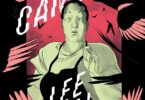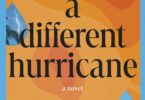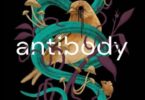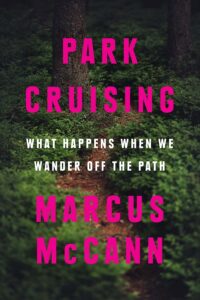 Reviewed by Brett Josef Grubisic
Reviewed by Brett Josef Grubisic
Marcus McCann, Park Cruising: What Happens When We Wander Off the Path (House of Anansi, 2023), 352pp., $21.99.
For the literal and figurative connotations alone, Marcus McCann chose a subtitle with broad appeal for Park Cruising, his book of eleven essays (and “In Lieu of an Afterword, a Valentine”). The subtitle, What Happens When We Wander Off the Path, invites eager questions. “Who’s ‘we’?” for instance, and “What does happen?”
Thoroughly researched but not drily academic, journalistic yet substantial, and clearly an activist’s passion project, McCann’s essays answer those concerns, and more, as they unfold. McCann touches on the “legal regulation of sexuality today,” theorizes the motivations (and social ends) of queer male park sex, and criticizes policing in its various guises. Along the way, McCann, something of an intellectual magpie, stops to consider Angels in America, the 1974 arrest of four women for publicly singing a Rodgers and Hammerstein song (one lyric altered: “dyke” for “girl”), and intergenerational homophobia. McCann forges likeable, roving essays that are interesting, pointed, informative, and insistent.
Detours aside, the essays expound on a range of topics but consistently return to public sex (particularly, those in corners of park sites “temporarily un- or under-patrolled, not completely under the control of the state”) and responses to it in the form of police action, legal statutes, and court cases. “One Long Hot Summer” is a grim chronicle about murders and assaults of suspected park cruisers, from Victoria to Halifax. A poetic meditation on “morality-first” urban planning, “Looking Out for Each Other” describes trips to Toronto’s Hanlan’s Point and Marie Curtis Park in Etobicoke. In “A Thousand Luminous Threads,” McCann’s bike trip to Cherry Beach results in sexual adventure and fraternity. The episode inspires his thoughts on what American thinker Samuel R. Delany called “affable but brief” relationships. Anatomized in several pieces, an emblematic police sting in Toronto code-named Project Maria, “pulls back the curtain on seedy conduct not by park cruisers but by the police.”
For McCann, “we” typically refers to men who have sex with men. He sees through “a sex-positive lens”; and though he acknowledges park sex as a “controversial item on the gay agenda” about which activists have never fully agreed, he proposes “much of cruising … is an invitation to love a stranger.” As for what happens when these guys wander off the path, McCann underscores the benefits but does not neglect to document the peril.
More generally, to McCann cruising is a facet of sexual behaviour. He regards sexual exploration as “healthy and good.” “For many,” he writes, “it is part of full human flourishing. It is a source of pleasure and release. It makes people happy.” Further, sexual spaces are “an embodiment of sexual difference and diversity. They fit within the larger economies of creativity, art, and expression.”
To wander off the path, then, promises rewarding fulfillment albeit with attendant risk.
In cruising, McCann discerns “a phenomenon with deep historical roots” that “connects people,” and enables “short-term warmth and compassion” where one may might be “recognized and heard.”
About these “social goods”—that can teach “good lessons about sexual consent,” “help alleviate shame and stigma,” and provide an “outlet for guys—whether they’re radicalized, closeted, religious, married, or none of the above”—McCann cites Michael Warner approvingly: “It is the pleasure of belonging to a sexual world, in which one’s sexuality finds an answering resonance not just in one another, but in a world of others.”
McCann also cites one of the assailants in a Montreal park murder: he claimed to want to “rid the park of faggots so children could play there again.” McCann appears distraught though not surprised. In his experience sexual minorities remain vulnerable. He notes, “Many of the things we do are on a spectrum of risk: holding hands on King Street, coming out to our colleagues, booking a stay at a bed and breakfast. Even ordering a cake carries the risk of rejection and shame.”
The other “we” implicit in McCann’s title is society in general, with its judiciary and police and alarmist newspaper headlines that seek to contain sexual intimacy. The current straight and narrow path of society is expressed through its surfeit of discomforts and strictures. Regarding rulings of the courts, McCann states, “the message is overwhelmingly don’t”; it’s “an index of prohibition,” and Supreme Court decisions operate “essentially as a list of dangers posed by sex.”
In the case of that “we,” veering off the usual path offers utopian prospects, not least a view of sexual coupling tied to freedom, self-expression, and jouissance.
Through the “anti-majoritarian lens,” McCann’s “way of looking at a phenomenon that is usually only glanced obliquely” proposes less policing and the diminishment of a judicial view that equates sex exclusively with danger.
“I now see the world as a great and chaotic mess,” McCann declares before a caveat: and yet “full of promise and possibility, a multiverse.” From police stings and homicides to celebratory accounts about a unique “source of pleasure,” his essays ponder the “world as it is” (and has been) but eye “the world as we want it to be.” McCann pins his hopes on that imaginary place.
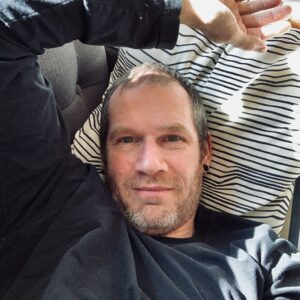 Brett Josef Grubisic resides on Salt Spring Island with two felines (Oliver and Jack) and his partner (Alexander).
Brett Josef Grubisic resides on Salt Spring Island with two felines (Oliver and Jack) and his partner (Alexander).

